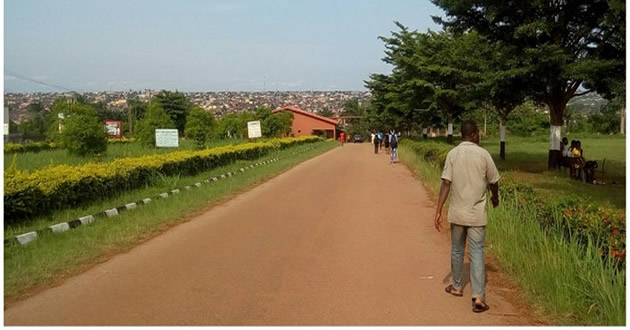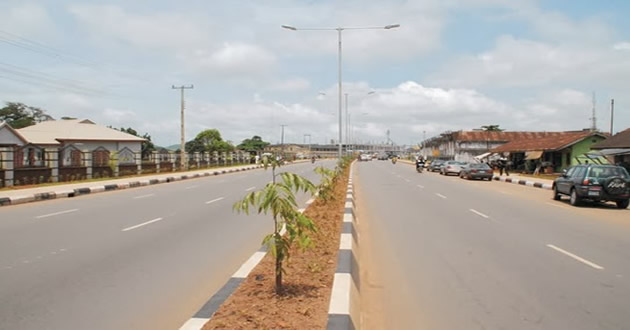
Agbor
Latitude: 6.2537 Lat (DMS) 6° 15' 13N
Longitude: 6.1942 Long (DMS) 6° 11' 39E
Elevation (Feet): 830
Population Est.: 367,947
Zipcode: 321211
History:
The History of Agbor Kingdom like those of other African ancient kingdoms, empires and peoples, is based largely on oral tradition. Various oral accounts on the origin of Agbor and Ika people exist but the most credible being that “Ogunagbon” and his followers, who founded Agbor, came from Benin and first settled in “Ominije”, presently located in today’s Agbor-Nta. Following what can best be described as personal crisis between two princes in Benin and subsequent settlement of this dispute as agreed to by the chiefs and elders of Benin determined by casting of lot, led to one of the princes settling in what became known as “Agbon”.
Agbon, like other Anioma towns and communities, was later anglicized by the British who found it difficult to pronounce as “Agbor” the present name of the town. Agbon (Agbor) in Benin means “Earth or “Land”. This alteration in pronunciation was not limited to Agbon; other Anioma communities also had a fair share. For instance, Igbuzo was anglicized as “Ibusa,” Ahaba (Asaba,) Ogwanshi-Ukwu (Ogwashi-Uku) Isei-Ukwu (Issele-Uku) Isei-Mkpitime (Issele-Mkpitime) Okpam (Okpanam) Umuede (Umunede). Notice also that in some cases the name remains the same but the spelling may change as in the case of Onicha (Onitsha) of Anambra state, another Anioma city.
Agbor consists of 23 villages and a metropolis called Orogodo (Boji-Boji).
The villages are as follow:
- Agbamuse/Oruru
- Agbor-nta
- Alihagwu
- Alifekede
- Alihami
- Aliokpu
- Alisor
- Alilehan
- Alisimien
- Alizomor
- Boji-Boji Agbor
- Ekuku-Agbor
- Emuhun
- Ewuru
- Idumu-Oza
- Ihaikpen
- Ihogbe
- Obielihe
- Ogbeisore
- Ogbeisogban
- Ogbemudein
- Oki
- Omumu
- Ozanogogo (Ozara)
According to an account, by 8,000 BC, early Agbor had already begun to evolve from the ashes of the wandering and individualistic lifestyle that was in vogue in prehistoric times. It was later in this state that Ominije emerged as the first Agbor settlement founded by the original inhabitants with Orhue as its Headquarters. Ominije later became known as Agbon and was anglicised and called Agbor by the colonial masters that found their way to the area much later. Ancient Ominije covered the area which now envelopes the present day quarters of Agbor-Nta, Oki, Ewuru, Aliagwu, and Amalia-the conglomerate that form part of the present town of Otorvbaiye and Idumuwogo settlements in Orhionwon LGA of Edo State.
As noted earlier Cheime, a refugee from Benin is historically credited with the foundation of majority of Anioma communities. Historical accounts records Cheime who was driven away from Benin fled from the kingdom traveling eastwards towards the Niger River and founded Onitsha where he finally settled, his followers having been exhausted founded certain of these Anioma towns. Many of which includes the present day Onicha-Uku, Onicha-Ugbo, Onicha-Olona, Onicha-Ukwu, Issele-Uku, Idumuje-Unoh, Idumuje-Ugboko and a lot more.
At the present day Onitsha in Anambra state, his final place of settlement, Cheime had had a daughter called Owuwu, Owuwu was believed in oral history to have abandoned Onitsha fearing she might lose her life after her father lost nine of his sons in this very town owing to witchcraft. Owuwu was soon to return to Agbor settling at Osarra in Agbor. The name “Owuwu” which now is a Quarter in Agbor is a historical testimony of this.
The argument in certain Quarters that Agbor people bear Igbo names and to some extent assimilates Igbo language and vocabularies is well a defeated one, it is asking why the language of Onitsha people is Igbo having been founded by Cheime from Benin.
Available records show that the British colonial government encouraged Christian missionaries from Igbo land who taught the Ika people using Igbo Bible, hymns and songs. Again the British disregarded homogeneity in their creation of provinces and regions in Nigeria as in else where. Onitsha emerged as a commercial nerve of Anioma but after the Anioma people lost in the Ekwumekwu wars, the town was put in separate province where it now finds itself.
Similar Names between Ika and Benin
1. Agbnifo
2. Ehima
3. Edeje
4. Imade
5. Izegbe
6. Isibor
7. Iredia
8. Iyama
9. Osifo
10. Ozegbe
Same festivals celebrated by Benin and Ika
1. Igue
2. Ugbose
Similar Names between Agbor and Benin
1. Ogan
2. Owuwu
3. Ihaikpen
4. Alisor
The people of Agbor have traditionally relied on farming and fishing for their food and commerce. This may have been occasioned by the fact that Agbor, a littoral community, is naturally endowed with balanced ecosystem: fertile soil, buoyant evergreen vegetation, streams, rivers and higher water bodies, healthy sunshine, maximum rainfall, and gentle coastal winds. Living in a naturally conditioned agro-aquatic environment, Agbor can boast of surplus food and fish all year round. In their markets, the sights of locally produced food items such as yam, banana, plantain, fruits and vegetables, etc., are commonplace. However, due to urban drift and nonchalant attitude of the youth and able-bodied men towards agriculture in recent times, one cannot say that the full agricultural potential of the area is being tapped nowadays.
The indigenes of Agbor town who are of Ika descent and speak Ika language, with some Bini and little Igbo influence, have a very rich cultural heritage. The various festivals observed by the people provide an opportunity to showcase the various aspects of the people’s culture. Some of this festivals, such as Igbose, which was instituted by Dein Ebonka in 1270 AD to mark God’s appearance to him in Oza Nogogo, is unique to the people of that area while Ihium Imani is observed only by Ewuru people. Festivals which are celebrated by the entire people of Agbor are Igue, Iwagi (New Yam Festival), and the Osiezi. Igue and Iwagi are celebrated annually while Osiezi is celebrated every three years.
Festivals in Agbor
- Igue Festival
- New Yam Festival (Iwa Igi)
Banks in Delta
Brief History of Delta
Business and Economy
Festivals and Carnivals
General and Teaching Hospitals
Hotels and Guest Houses
Local Governments & LCDAs
Delta State Ministries Agencies and Parastatals
Police Stations
Popular Markets
Prominent Towns
Restaurants, Bars, Night Clubs
Shopping Malls
Delta State Executive Council
Tourist Attractions
Traditional Rulers




